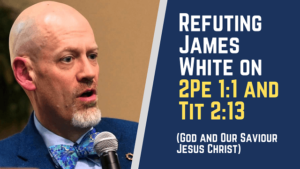Surprisingly, the 1611 edition of the KJV has a comma after God at 2 Peter 1:1 [God, and our Saviour Jesus Christ], and that comma seems to have remained in most KJV editions printed up to the 1769 Oxford edition. The 1743 Cambridge and 1760 Cambridge editions had actually removed it before the 1769. Even the first KJV edition printed in America in 1782 and KJV editions printed at Oxford in 1788 and in 1795 still have a comma after God at 2 Peter 1:1. How does this comma in most KJV editions up to the 1769 Oxford affect the understanding and interpretation of this verse? Concerning this verse in his 1633 commentary on 2 Peter, Thomas Adams observed: “Some read these words by disjoining them; of God, and of our Saviour,“ which would seem to refer to the rendering in the 1611 KJV.
At its note for 2 Peter 1:1, the Reformation Heritage KJV Study Bible noted: “Literally, ‘our God and Savior, Jesus Christ,‘ describing one divine person--the same Greek phrase appears in v. 11, but with ‘Lord” in place of ‘God.‘ Christ is Lord and God (John 1:1; 20:28; Rom. 9:5)“ (p. 1829). James Scholefield maintained that this verse has “the same construction as in verse 11” where it was rendered in the KJV as “of our Lord and Saviour Jesus Christ” (Hints, p. 157). A. T. Robertson wrote: “In 2 Peter 1:11 and 3:18, the pronoun ’our’ comes after ’Lord,’ but that makes no difference in the idiom. It is ’our Lord and Saviour,’ and it is so translated in the English versions. But we have precisely the same idiom in 2 Peter 1:1, ’our God and Saviour Jesus Christ’” (The Minister, p. 63). Robertson asserted: “The idiom compels the translation, ’our God and Saviour Jesus Christ” (p. 64). Concerning 2 Peter 1:1, Ralph Wardlaw noted in 1815: “An instance of construction, in every respect the same, occurs at the eleventh verse of this same chapter” (Discourses, p. 75). Wardlaw asserted: “It is just as improper to render the words in the first verse, ‘through the righteousness of God and our Saviour Jesus Christ,‘ (unless the appellations ‘God and our Saviour’ be understood as both connecting with ‘Jesus Christ’) as it would be to render those in this verse [1:11] ‘in the kingdom of the Lord and our Saviour Jesus Christ’” (p. 76). Do KJV-only advocates oppose the same measures and principles being applied to 2 Peter 1:1 as would be applied to 2 Peter 1:11?
Several pre-1611 English Bibles and many post-1611 English Bibles clearly, precisely, and accurately identify Jesus Christ as "our God and Saviour" at 2 Peter 1:1. William Tyndale in 1534, Miles Coverdale in 1535, and John Rogers in 1537 translated the last part of this verse as "righteousness that cometh of our God and Saviour Jesus Christ." In his 1538 Latin-English New Testament, Miles Coverdale rendered it “righteousness of our God and Saviour Jesus Christ.” The 1539 Great Bible, 1557 Whittingham's New Testament, 1560 Geneva Bible, 1568 Bishops' Bible, 1576 Tomson’s New Testament, 1657 Haak’s English translation of the Dutch Bible, 1755 Wesley's New Testament, 1842 Baptist or Bernard's, 1862 Young’s Literal Translation, 1866 American Bible Union Version, 1982 NKJV, 1994 Majority Text Interlinear, and other English translations render it "righteousness of our God and Saviour [or Savior] Jesus Christ." Thomas Goodwin maintained that “[Theodore] Beza reads it, ‘our God and our Saviour Jesus Christ,’” and that “it clearly meant one person, viz. Christ” (Works, VIII, p. 283).
At 2 Peter 1:1, the 2005 Cambridge edition of the KJV has this note taken from the standard 1762 Cambridge edition: “Gr. of our God and Saviour.” KJV editions printed at Oxford in 1810, 1821, 1835, 1857, 1865, 1868, and 1885, and at Cambridge in 1769, 1844, 1872, and 1887 also have this same note indicating the accurate translation and meaning of the Greek. An earlier KJV edition printed in London in 1711 had the same note and a cross reference to Titus 2:13.
Concerning 2 Peter 1:1 in the Westminster Annotations printed in 1645, this note was also given: “Gr. Of our God and Saviour Jesus Christ.” Thus, the Bible scholars at the Westminster Assembly agreed with the pre-1611 English Bible translators and the editors of some standard KJV editions.

 pastorwagner.com
pastorwagner.com

 pastorwagner.com
pastorwagner.com
